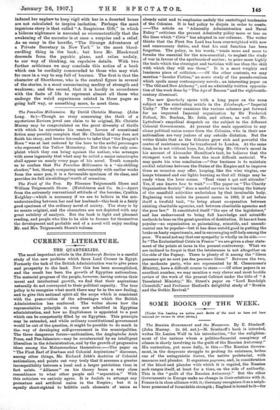C URRENT LITE RAT URE.
THE QUARTERLIES.
The most important article in the Edinburgh Review is a careful study of the, new problem which faces Lord Cromer in Egypt. Formerly the task of the British Administration was to give peace and prosperity to the land. Now this has been accomplished, and the result has been the growth of Egyptian nationalism. The material progress of the people, however, having outrun their , moral and intellectual growth, we find that their aspirations naturally do not correspond to their political capacity. The true policy is to-recognise what merit there may be in the new feeling, and to give this national spirit all the scope which is consistent with the preservation of the advantages which the British Administration has conferred. The writer shows how the representative principle is even now admitted in Egyptian administration, and how no Englishman is appointed to a post which can be competently filled by an Egyptian. This principle may be extended, and while ordinary constitutional government would be out of the question, it might be possible to do much in the, way of developing self-government in the municipalities. The three dangerous forces—nationalism, the Anglophobe Arab Press, and Pan-Islamism—may be counteracted by an intelligent liberalism in the Administration, and by the growth of progressive ideas among the Mohammedans themselves.—The paper on " The First Earl of Durham and Colonial Aspirations" discusses, among other things, Mr. Richard Jebb's doctrine of Colonial nationalism, and points out very truly that it assumes a greater incompatibility between a local and a larger patriotism than in fact exists. " Alliance " on his theory bears a very close resemblance to what other people call "separation." With this criticism we entirely agree. It is foolish to attempt any premature and artificial union in the Empire ; but it is equally short.sighted to belittle such elements of union as already exist and to.emphasise unduly' the centrifugal tendencies of the Colonies. It is bad policy to disjoin in order to create. —The article on "Admiralty Administration and Naval Policy" criticises tie present Admiralty policy more or less on the lines which " Civis " has adopted in our columns. The writer thinks that the First Sea Lord has been overweighted With new and unnecessary duties, and that his real function has been forgotten. The policy, in his words, "tends more and more to forsake the essential for the non-essential ; to neglect the study of war in favour of the apotheosis of matter; to prize more highly the tools which the strategist and tactician will use than the skill with which they will use them." It is a most weighty and luminous piece of criticism.—Of the other contents, we may mention "Insular Fiction," an acute study of the pseudo-realism which spoils many contemporary novels ; an interesting paper on "The Old and New Alchemy"; and an admirably written apprecia- tion of the work done by "The Age of Reason" and the eighteenth. century illuminati.
The new Quarterly opens with a long paper on the same subject as the concluding article in the Edinburgh,—" Imperial Unity." The writer examines the various schemes put forward for an improved Imperial organisation by Sir Frederick Pollock, Mr. Buchan, Mr. Jebb, and others, as well as Mr. Lyttelton's encyclical despatch on the subject to the different Colonial Governments. At present the main opposition to any closer political union comes from the Colonies, who in their new nationalism are very jealous of any outside dictation. But the writer thinks that as the Colonies grow rich and powerful the centre of resistance may be transferred to London. At the same time, he is not without hope, for, following Mr. Oliver's moral in his account of Alexander Hamilton's task, he believes that the strongest work is made from the most difficult material. We may quote his wise conclusion :—" Our business is to maintain cordial relations between the States of the Empire and to improve them as occasion may offer, keeping, like the wise virgins, our lamps trimmed and our lights burning so that all things may be ready when the hour comes. 'Tout vient h qui sait attondre.' Yes, if one knows how to wait." —The piper on "The Charity Organisation Society" does a useful service in tracing the history of the manifold activities undertaken by that invaluable body. Beginning work under its present name in 1869, it sat before itself a twofold task, "to bring about co-operation between existing charitable agencies, and between charitable agencies and the poor law." It constituted itself "the eye of the legislature," and has endeavoured to bring full knowledge and scientific methods to bear on the great question of destitution. It has not been popular—no organisation so painstaking, scientific, and unsenti- mental can be popular—but it has done untold good in putting the brake on hasty experiments, and in encouraging self-help among the poor. We need not say that our sympathy is wholly on its side.— In
"The Ecclesiastical Crisis in France" we are given a clear state- ment of the points at issue in the present controversy. What we are inclined to forget is that the intolerance is not altogether on the side of the Papacy. There is plenty of it among the " libres penseurs qui ne soot pas des penseurs libres." Between the two, the moderate party, who are represented by M. Clemenceau's Ministry, have a difficult course to steer.—Of other papers in ar excellent number, we may mention a very clever and most hostile review of the work of the present Cabinet tinder the title of "A Tesselated Ministry," Mr. Street's paper on "Lord Randolph Churchill," and Professor Herford's delightful study of "Ruskin and the Gothic Revival."






















































 Previous page
Previous page